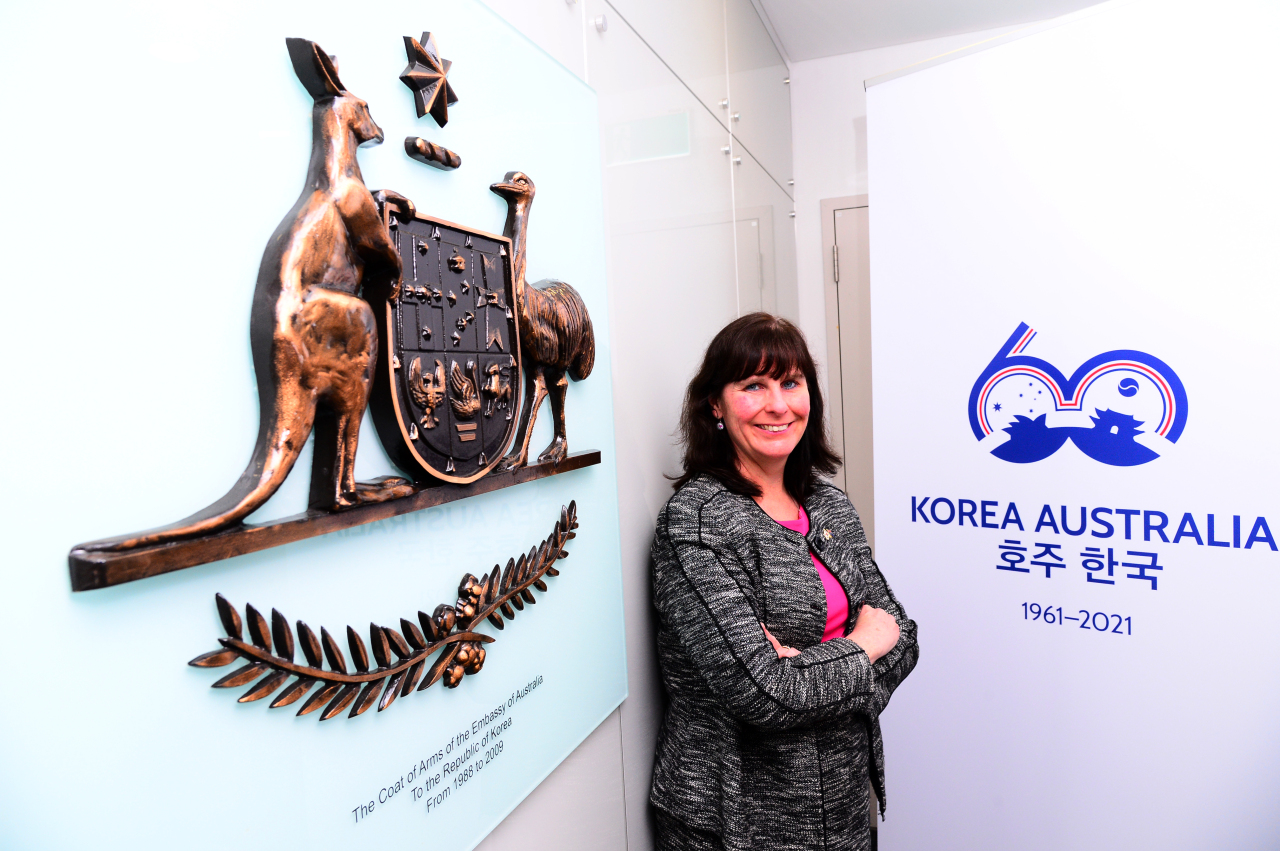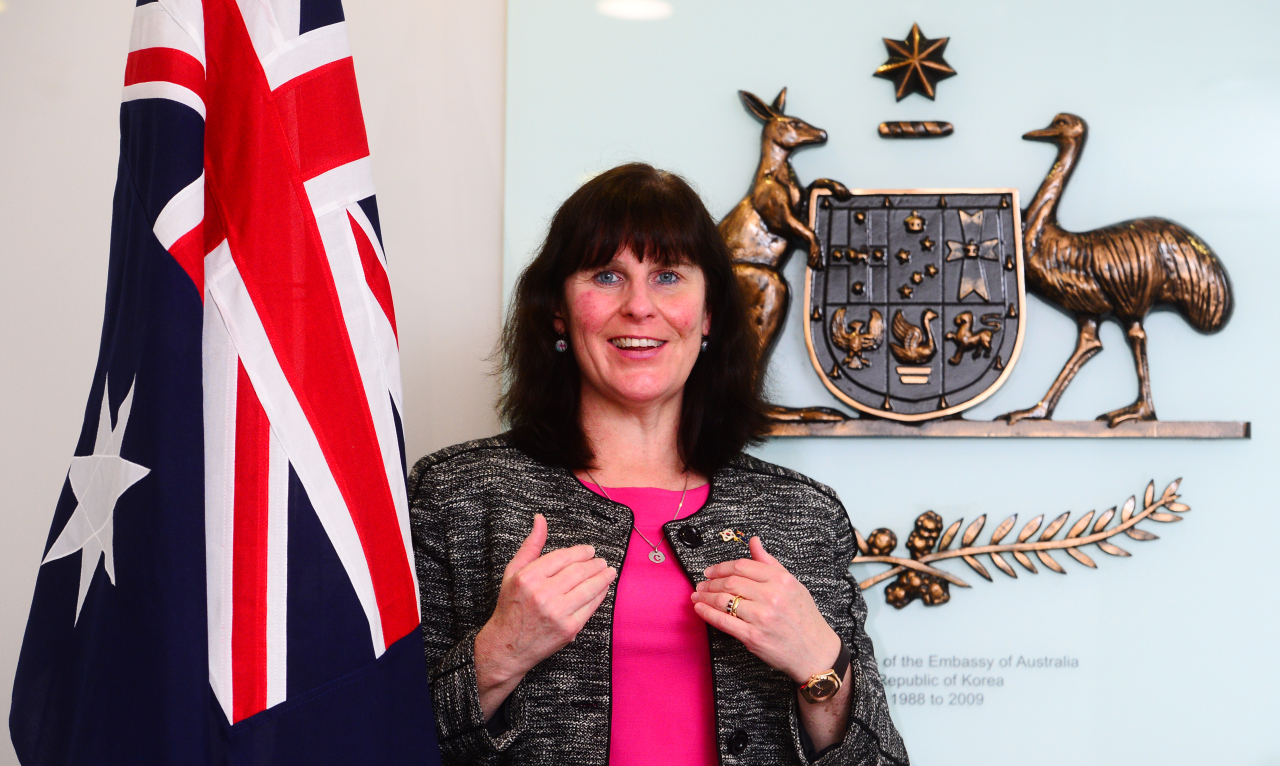 |
Catherine Raper, Australian ambassador to South Korea, poses for a photo during an interview with The Korea Herald at her office in Jongno, Seoul. (Park Hae-mook/The Korea Herald) |
South Korea has a role to play in bringing about an open and inclusive Indo-Pacific region anchored by international rules, as the Quad alliance -- a group of Pacific democracies including the US, India, Japan and Australia -- seeks a partnership between like-minded countries, the Australian ambassador to Korea says.
The US-led coalition is seen as trying to counter China’s growing influence in the region, and that represents a challenge for Korea. Seoul is looking to balance its alliance with Washington and its economic ties to Beijing.
“From Korea’s perspective, the Korean government has the same vision for the region. We’re already seeing complimentary actions, for example, Korea’s New Southern Policy,” Catherine Raper, Australian ambassador to Korea, said during an interview with The Korea Herald at her office in Jongno, Seoul.
The initiative, which President Moon Jae-in revealed in November 2017 just a few months into his presidency, aims to reduce Korea’s reliance on its largest trading partner China. It could do so by better connecting Korea to the Association of Southeast Asian Nations, which is home to more than half a billion people.
Raper described expanding ties with the economic union of 10 countries as having positive engagement in line with international rules and norms, adding Seoul and Canberra should work to solidify that commitment.
The ambassador, who admitted that Australia and China have seen difficulties in their relations recently, suggested dialogue to work out “points of disagreement” with Beijing, which she called Canberra’s largest trading partner by a significant margin.
Tit-for-tat diplomatic retaliation followed after Canberra called an international inquiry into the source of the COVID-19 pandemic, while Beijing responded with trade reprisals on Australian coal, beef and wine.
 |
Catherine Raper, Australian ambassador to South Korea, poses for a photo during an interview with The Korea Herald at her office in Jongno, Seoul. (Park Hae-mook/The Korea Herald) |
Meanwhile, Raper discussed building on long-standing economic cooperation between Korea and Australia, referring to a recent forum on hydrogen energy, which was attended by key policymakers and industry experts from both countries.
In 2019, the two agreed to work together to develop the green fuel to deliver on the carbon-cutting commitment.
“This is really a signal to businesses that the governments support their efforts and that we want to have a right kind of framework in place,” Raper said.
At the climate summit hosted by US President Joe Biden in late April, Moon promised to achieve a carbon-neutral Korea by 2050, while Australian Prime Minister Scott Morrison said his country will reach net zero “as quickly as possible and preferably by 2050.”
“We’re now talking to the Korean government about taking this (joint hydrogen project) to the next step and having a joint government working group on hydrogen,” Raper said, adding the two governments will roll out something concrete in July.
The ambassador stressed technology exchanges between Korean and Australian businesses as key to ushering in a new economy running on renewables, referring to what she called a Technology-Bridge initiative, which is backed by both governments.
The exchange aims to bolster people-to-people links between scientists and researchers in future-focused industries of mutual strategic interest.
“The theme of this year’s Tech-Bridge is aligned to the response to the COVID-19 pandemic and will focus on the Application of Artificial Intelligence to Counter Infectious Disease,” she said, adding Seoul and Canberra are also working on a joint vaccine workshop for the region.
Korea and Australia, which mark 60 years of diplomatic ties this year, have had a history of working together to support each other’s development and economic growth and should build on that legacy for years to come, Raper said.
By Choi Si-young (
siyoungchoi@heraldcorp.com)









![[Today’s K-pop] Blackpink’s Jennie, Lisa invited to Coachella as solo acts](http://res.heraldm.com/phpwas/restmb_idxmake.php?idx=644&simg=/content/image/2024/11/21/20241121050099_0.jpg)